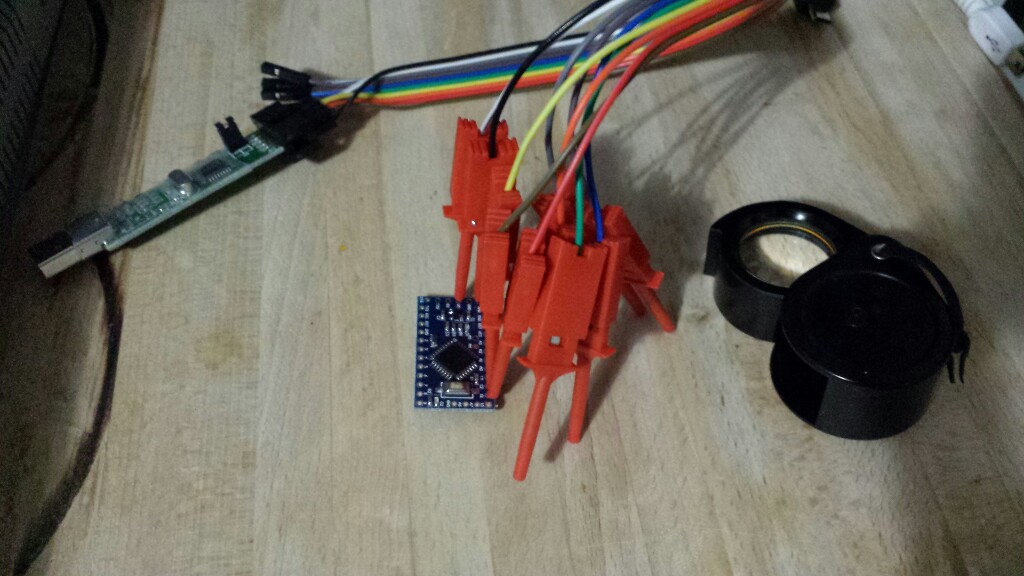LC Technology order
Posted at 2014-01-15.
I ordered some boards marked as being from LC technology.
The package arrived relatively quick, although it smells faintly kind of like turpentine.
One tiny AVR (duino), ST-Link interface, and an STM32 breakout/target board.
I should get around to testing these.
ST-link v2
The ST-Link chip has something waxy on it that could be swabbed off. Seems like a strange way to coat boards. It doesn't look like it was supposed to obscure the chip either, so I would guess flux residue.
usb 1-2: new full-speed USB device number 2 using uhci_hcd
usb 1-2: New USB device found, idVendor=0483, idProduct=3748
usb 1-2: New USB device strings: Mfr=1, Product=2, SerialNumber=3
usb 1-2: Product: STM32 STLink
usb 1-2: Manufacturer: STMicroelectronics
usb 1-2: SerialNumber: W\xffffffc3\xffffffbf\xffffffbfo\x06e\xffffffc2\xffffff80\xffffff80TV"Y\x10g
Ok, then. Red LED. Will need software. I don't know how much can be tested without a target.
Atmega
For this I got some data (chip sheet plus schematic) via email.
The AVR board's switch looks like the top has melted. It's perhaps been run through a soldering profile that's too hot. It also looks like it has a resonator on it along with an Atmega168PA. A Picopower version, that is. I wasn't expecting either detail.
This one needs hooks or headers for testing. A Bus Pirate might do. I decided to use some hooks and a usbasp instead. Powering on gets a power LED and a blinky light (bootloader?).
Running avrdude:
% avrdude -p m168p -c usbasp
avrdude: warning: cannot set sck period. please check for usbasp firmware update.
avrdude: AVR device initialized and ready to accept instructions
Reading | ################################################## | 100% 0.01s
avrdude: Device signature = 0x1e940b
avrdude: safemode: Fuses OK (H:00, E:DD, L:FF)
avrdude done. Thank you.
The fuses, according to online AVR fuse calculator, say >8M ext osc, BOD at 4.3V, EESAVE, WDTON, Reset disabled(!?) etc. If that's true, it doesn't seem to interfere with ISP.
Trying the bootloader or flashing in some fw might be the next step. Or actually soldering on some headers. Maybe making a baseboard with a permanent ISP socket.
STM32
A small STM32F103RBT6 breakout with USB, regulators, and JTAG. Kind of resembles Olimex STM32-H103 and other similar boards.
The STM32 board has a similar button that does not look charred. There might also be some flux residue, but otherwise the board looks as it should.
usb 1-2: new full-speed USB device number 3 using uhci_hcd
usb 1-2: device descriptor read/64, error -71
usb 1-2: device descriptor read/64, error -71
usb 1-2: new full-speed USB device number 4 using uhci_hcd
usb 1-2: device descriptor read/64, error -71
usb 1-2: device descriptor read/64, error -71
usb 1-2: new full-speed USB device number 5 using uhci_hcd
usb 1-2: device not accepting address 5, error -71
usb 1-2: new full-speed USB device number 6 using uhci_hcd
usb 1-2: device not accepting address 6, error -71
hub 1-0:1.0: unable to enumerate USB device on port 2
That might be correct blank chip behaviour. At least something is attached to the USB port on board. I poked at it a bit over JTAG with promising results out of the box.
